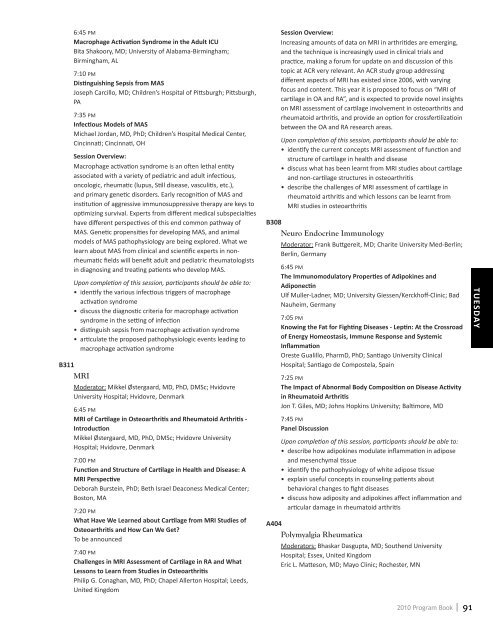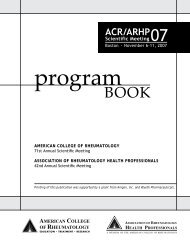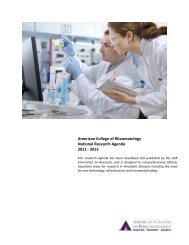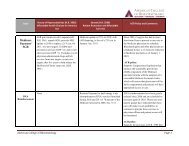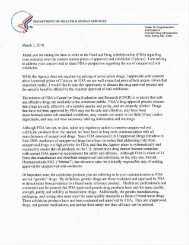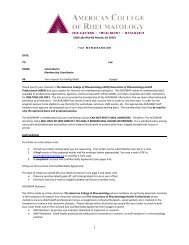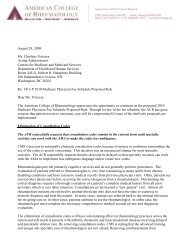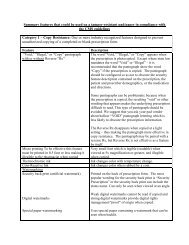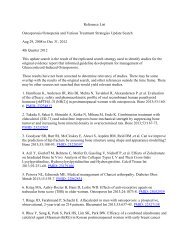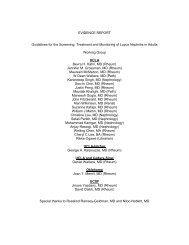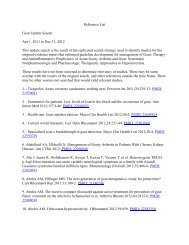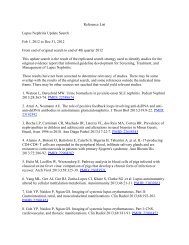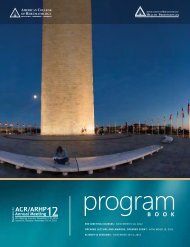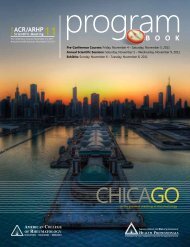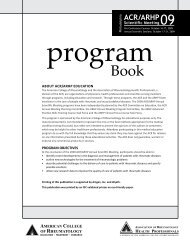B O O K - American College of Rheumatology
B O O K - American College of Rheumatology
B O O K - American College of Rheumatology
Create successful ePaper yourself
Turn your PDF publications into a flip-book with our unique Google optimized e-Paper software.
6:45 PM<br />
Macrophage Activation Syndrome in the Adult ICU<br />
Bita Shakoory, MD; University <strong>of</strong> Alabama-Birmingham;<br />
Birmingham, AL<br />
7:10 PM<br />
Distinguishing Sepsis from MAS<br />
Joseph Carcillo, MD; Children’s Hospital <strong>of</strong> Pittsburgh; Pittsburgh,<br />
PA<br />
7:35 PM<br />
Infectious Models <strong>of</strong> MAS<br />
Michael Jordan, MD, PhD; Children’s Hospital Medical Center,<br />
Cincinnati; Cincinnati, OH<br />
Session Overview:<br />
Macrophage activation syndrome is an <strong>of</strong>ten lethal entity<br />
associated with a variety <strong>of</strong> pediatric and adult infectious,<br />
oncologic, rheumatic (lupus, Still disease, vasculitis, etc.),<br />
and primary genetic disorders. Early recognition <strong>of</strong> MAS and<br />
institution <strong>of</strong> aggressive immunosuppressive therapy are keys to<br />
optimizing survival. Experts from different medical subspecialties<br />
have different perspectives <strong>of</strong> this end common pathway <strong>of</strong><br />
MAS. Genetic propensities for developing MAS, and animal<br />
models <strong>of</strong> MAS pathophysiology are being explored. What we<br />
learn about MAS from clinical and scientific experts in nonrheumatic<br />
fields will benefit adult and pediatric rheumatologists<br />
in diagnosing and treating patients who develop MAS.<br />
Upon completion <strong>of</strong> this session, participants should be able to:<br />
• identify the various infectious triggers <strong>of</strong> macrophage<br />
activation syndrome<br />
• discuss the diagnostic criteria for macrophage activation<br />
syndrome in the setting <strong>of</strong> infection<br />
• distinguish sepsis from macrophage activation syndrome<br />
• articulate the proposed pathophysiologic events leading to<br />
macrophage activation syndrome<br />
B311<br />
MRI<br />
Moderator: Mikkel Østergaard, MD, PhD, DMSc; Hvidovre<br />
University Hospital; Hvidovre, Denmark<br />
6:45 PM<br />
MRI <strong>of</strong> Cartilage in Osteoarthritis and Rheumatoid Arthritis -<br />
Introduction<br />
Mikkel Østergaard, MD, PhD, DMSc; Hvidovre University<br />
Hospital; Hvidovre, Denmark<br />
7:00 PM<br />
Function and Structure <strong>of</strong> Cartilage in Health and Disease: A<br />
MRI Perspective<br />
Deborah Burstein, PhD; Beth Israel Deaconess Medical Center;<br />
Boston, MA<br />
7:20 PM<br />
What Have We Learned about Cartilage from MRI Studies <strong>of</strong><br />
Osteoarthritis and How Can We Get?<br />
To be announced<br />
7:40 PM<br />
Challenges in MRI Assessment <strong>of</strong> Cartilage in RA and What<br />
Lessons to Learn from Studies in Osteoarthritis<br />
Philip G. Conaghan, MD, PhD; Chapel Allerton Hospital; Leeds,<br />
United Kingdom<br />
Session Overview:<br />
Increasing amounts <strong>of</strong> data on MRI in arthritides are emerging,<br />
and the technique is increasingly used in clinical trials and<br />
practice, making a forum for update on and discussion <strong>of</strong> this<br />
topic at ACR very relevant. An ACR study group addressing<br />
different aspects <strong>of</strong> MRI has existed since 2006, with varying<br />
focus and content. This year it is proposed to focus on “MRI <strong>of</strong><br />
cartilage in OA and RA”, and is expected to provide novel insights<br />
on MRI assessment <strong>of</strong> cartilage involvement in osteoarthritis and<br />
rheumatoid arthritis, and provide an option for crossfertilizatioin<br />
between the OA and RA research areas.<br />
Upon completion <strong>of</strong> this session, participants should be able to:<br />
• identify the current concepts MRI assessment <strong>of</strong> function and<br />
structure <strong>of</strong> cartilage in health and disease<br />
• discuss what has been learnt from MRI studies about cartilage<br />
and non-cartilage structures in osteoarthritis<br />
• describe the challenges <strong>of</strong> MRI assessment <strong>of</strong> cartilage in<br />
rheumatoid arthritis and which lessons can be learnt from<br />
MRI studies in osteoarthritis<br />
B308<br />
Neuro Endocrine Immunology<br />
Moderator: Frank Buttgereit, MD; Charite University Med-Berlin;<br />
Berlin, Germany<br />
6:45 PM<br />
The Immunomodulatory Properties <strong>of</strong> Adipokines and<br />
Adiponectin<br />
Ulf Muller-Ladner, MD; University Giessen/Kerckh<strong>of</strong>f-Clinic; Bad<br />
Nauheim, Germany<br />
7:05 PM<br />
Knowing the Fat for Fighting Diseases - Leptin: At the Crossroad<br />
<strong>of</strong> Energy Homeostasis, Immune Response and Systemic<br />
Inflammation<br />
Oreste Gualillo, PharmD, PhD; Santiago University Clinical<br />
Hospital; Santiago de Compostela, Spain<br />
7:25 PM<br />
The Impact <strong>of</strong> Abnormal Body Composition on Disease Activity<br />
in Rheumatoid Arthritis<br />
Jon T. Giles, MD; Johns Hopkins University; Baltimore, MD<br />
7:45 PM<br />
Panel Discussion<br />
Upon completion <strong>of</strong> this session, participants should be able to:<br />
• describe how adipokines modulate inflammation in adipose<br />
and mesenchymal tissue<br />
• identify the pathophysiology <strong>of</strong> white adipose tissue<br />
• explain useful concepts in counseling patients about<br />
behavioral changes to fight diseases<br />
• discuss how adiposity and adipokines affect inflammation and<br />
articular damage in rheumatoid arthritis<br />
A404<br />
Polymyalgia Rheumatica<br />
Moderators: Bhaskar Dasgupta, MD; Southend University<br />
Hospital; Essex, United Kingdom<br />
Eric L. Matteson, MD; Mayo Clinic; Rochester, MN<br />
tuesday<br />
2010 Program Book 91


